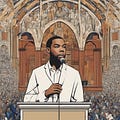Reading list:
An Open Letter to Ta-Nehisi Coates and the Liberals Who Love Him, by Cedric Johnson
The Enduring Solidarity of Whiteness [a reply to Johnson’s open letter], by Ta-Nehisi Coates
The Panthers Can’t Save Us Now, by Cedric Johnson
What Black Life Actually Looks Like, by Cedric Johnson
The Case for Reparations, by Ta-Nehisi Coates
The Coates Chronicles: The White Period, by Daniel Oppenheimer
My guest on the show today is Cedric Johnson, professor of political science and black studies at the University of Illinois Chicago and the author, most recently, of After Black Lives Matter: Policing and Anti-Capitalist Struggle.
I asked Cedric on to talk about two things, but I think in a sense they’re one thing, or at least very continuous with each other. The first is Ta-Nehisi Coates, perhaps the most significant American public intellectual of the last few decades. The second is Cedric’s recent book, After Black Lives Matter, and its critique, from the Marxist left, of both Black Lives Matter and the broader antiracist liberalism of which, according to Cedric’s analysis, it is a manifestation.
Coates doesn’t play a role in the new book, but he is, by my lights at least, the figure at the center of the ongoing race vs. class intra-left debate in which Cedric continue to intervene. Here’s how Cedric describes it in his 2016 piece for Jacobin magazine, “An Open Letter to Ta-Nehisi Coates and the Liberals Who Love Him,”
Ultimately, Coates’s views about class and race — and this nation’s complex and tortured historical development — are well-meaning and at times poetic, but wrongheaded. The reparations argument is rooted in black nationalist politics, which traditionally elides class and neglects the way that race-first politics are often the means for advancing discrete, bourgeois class interests. … Most of all, Coates is wrong about how we have achieved black political and social progress in the past, and what we should do going forward. From the antebellum anti-slavery struggles to the postwar southern desegregation campaigns to contemporary battles against austerity, interracialism and popular social struggle have been central to improving the civic and material circumstances of African Americans, and at the level of daily life, such movements have confronted racist habits and perceptions, sweeping aside old boundaries to create new notions of communion and solidarity.
Cedric is the author of, among other books, The Panthers Can’t Save Us Now (Verso, 2022), Revolutionaries to Race Leaders: Black Power and the Making of African American Politics (University of Minnesota Press, 2007) and this year's After Black Lives Matter. He is also the editor of The Neoliberal Deluge: Hurricane Katrina, Late Capitalism and the Remaking of New Orleans (University of Minnesota Press, 2011). His writings have appeared in Labor Studies, Catalyst, Dissent, Nonsite, Jacobin, New Labor Forum, Perspectives on Politics, and Historical Materialism. In 2008, Johnson was named the Jon Garlock Labor Educator of the Year by the Rochester Central Labor Council, AFL-CIO. He is a member of UIC United Faculty Local 6456.
















Ta-Nehisi Coates, the Liberals Who Love Him, and the Leftists Who Don't